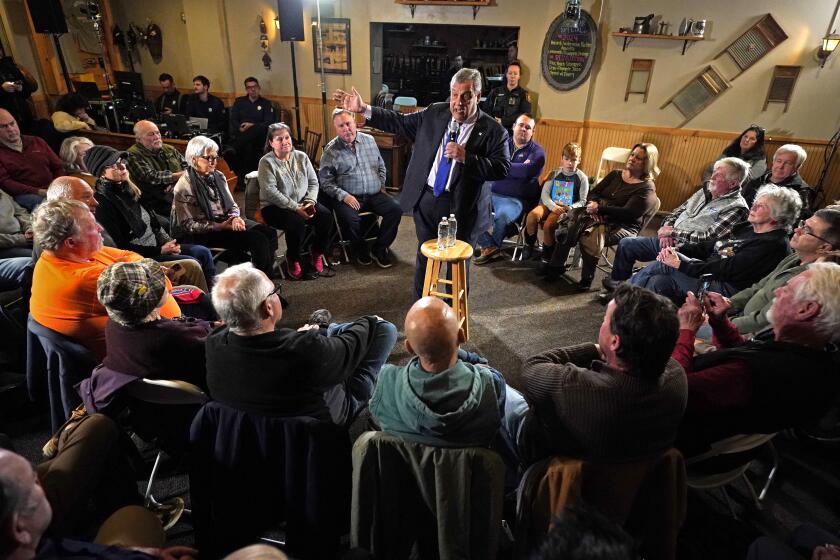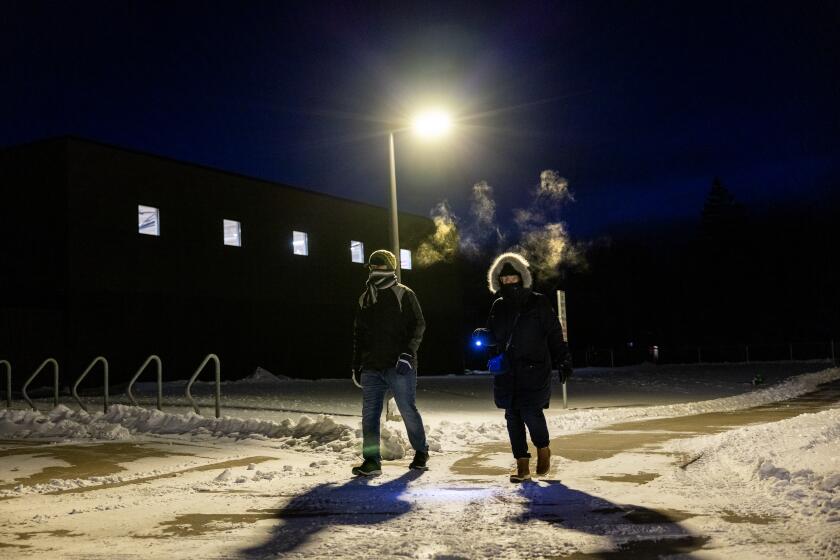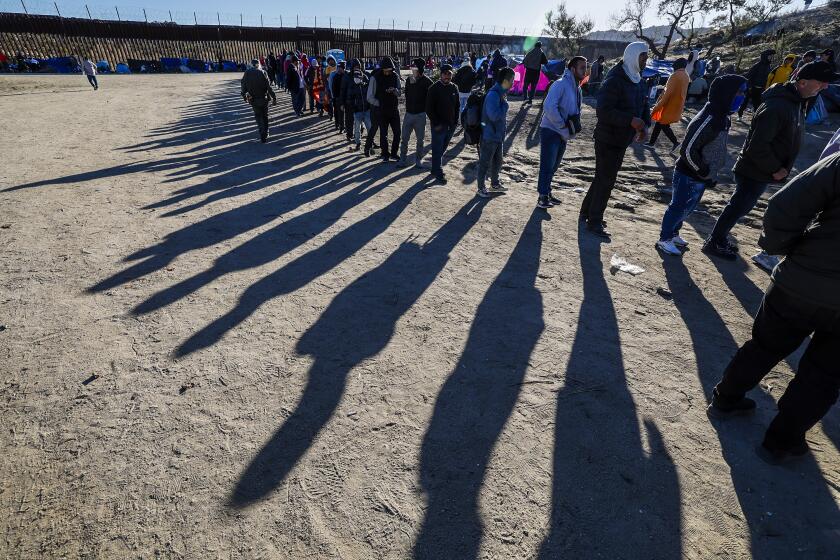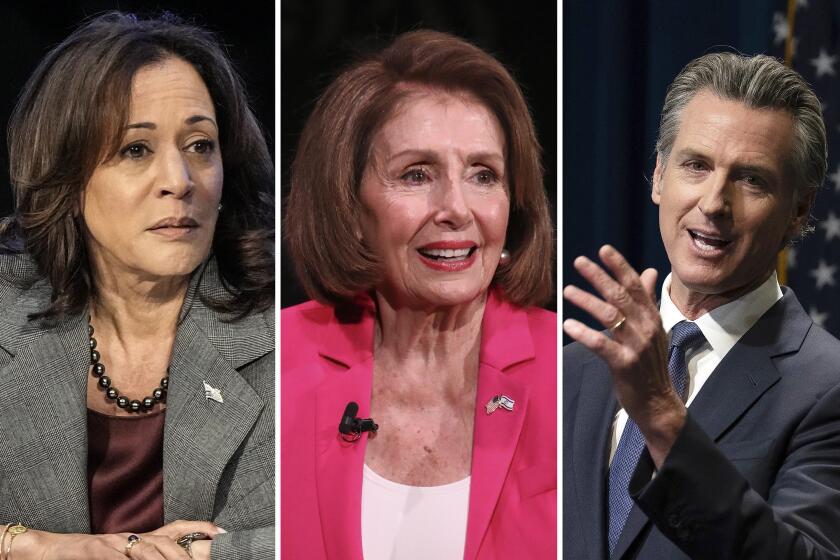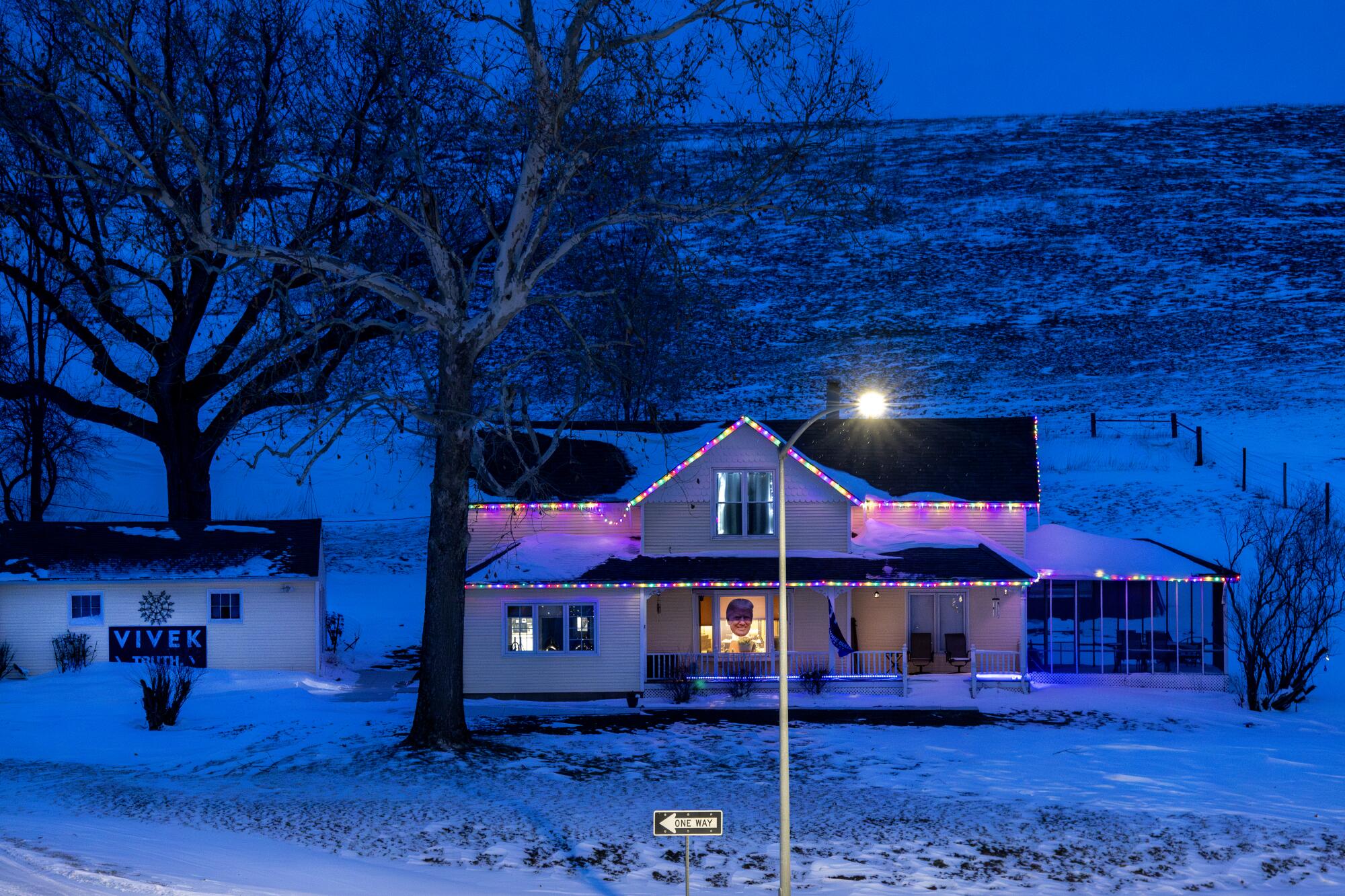
- Share via
DENISON, Iowa — Set among rolling hills about an hour from the Nebraska border, this picturesque farm town is filled with brick buildings exuding 19th century charm. It also happens to be the most Latino town in the state, with Latinos making up at least half the population.
But when 385 people filtered into the theater at Denison High School for the Republican caucus, they mostly resembled caucusgoers found elsewhere in Iowa: farmers with long beards, retirees wearing smiles and heavy coats. Almost all were non-Latino whites.
Near the front of the theater, Vicenta Lira Cardenas and her husband, Ismael Cardenas, were two of the rare exceptions. They smiled politely when they made eye contact with other caucusgoers, and, as local GOP leaders began the proceedings, Vicenta whispered occasional translations to Ismael.
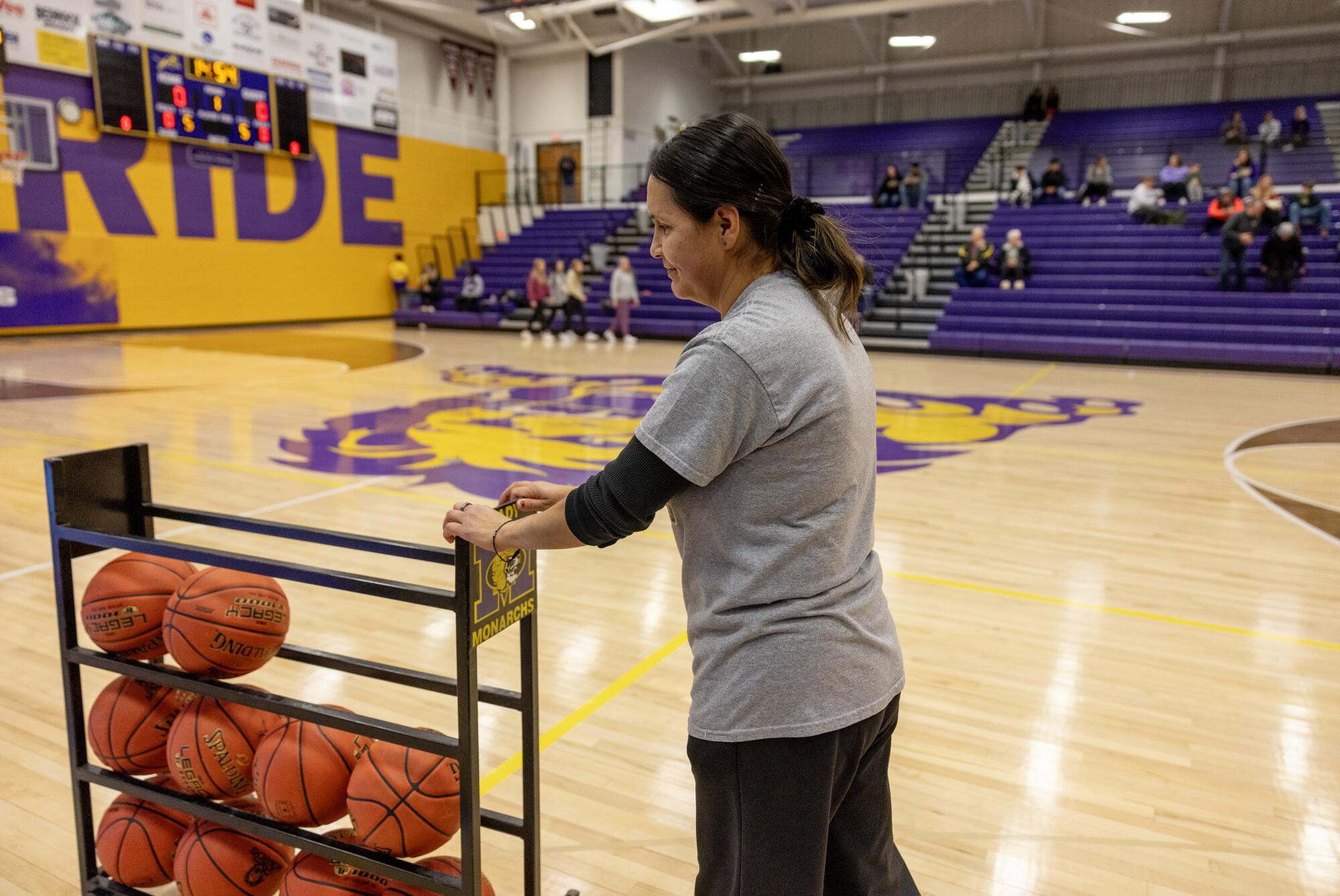
Since 2020, when then-President Trump made double-digit gains with Latino voters across the country, Republicans have bragged that a major realignment is underway. Democrats have long relied on winning about 65% of the Latino vote. If Republicans can get that number closer to 50%, they could keep the Democrats out of the White House for a generation.
Moderate and independent voters are key to Nikki Haley’s chances of winning New Hampshire’s Republican primary. Many won’t stick with the GOP in the general election.
While Iowa may not be a center of Latino life like California or Texas, the dismal Latino turnout at the caucus in Denison did not bode well for the Republican Party’s efforts to expand its ranks.
Even so, conversations with people in town show the GOP has a real opportunity and that many Latinos are deeply unsatisfied with President Biden.
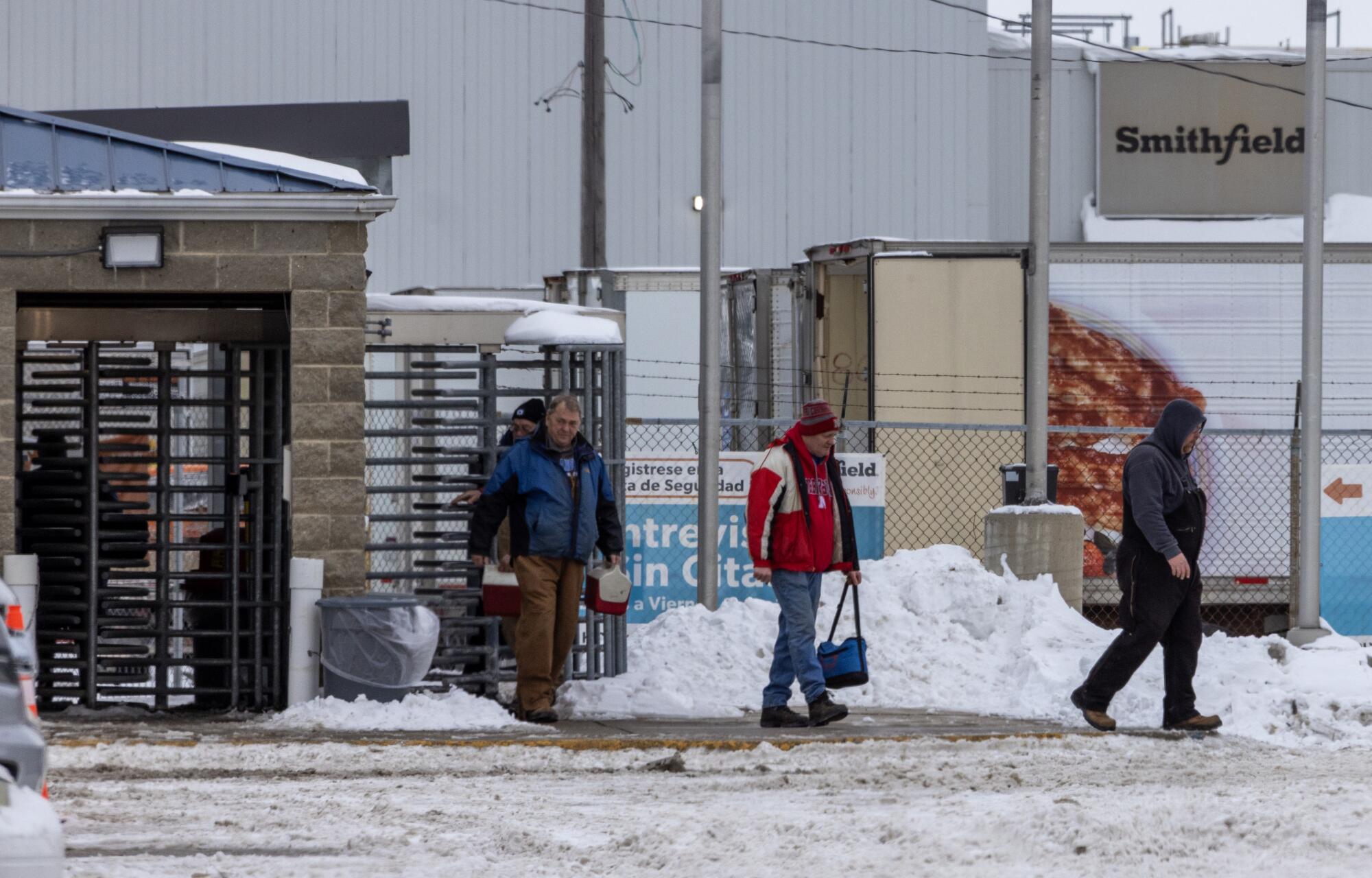
This was Vicenta’s first caucus since she immigrated from Michoacán, Mexico, in 1995. But she’s voted in plenty of general elections. In 2008, she enthusiastically supported Barack Obama, believing in his pledge to normalize status for millions of undocumented people in his first 100 days. She voted for him again in 2012, but by 2016 when that had not been achieved, she turned away from the Democrats.
“What Trump says is what Trump does. If he promises something, he is going to do it,” Ismael, soft-spoken, said in Spanish after the caucus had ended.
“That’s it, exactly,” said Vicenta. “Democrats talk so eloquently, but their actions are not good. The way Trump talks may not be nice. I think, at times, he has said racist things. But his actions, his policies are good. And he keeps his promises.”
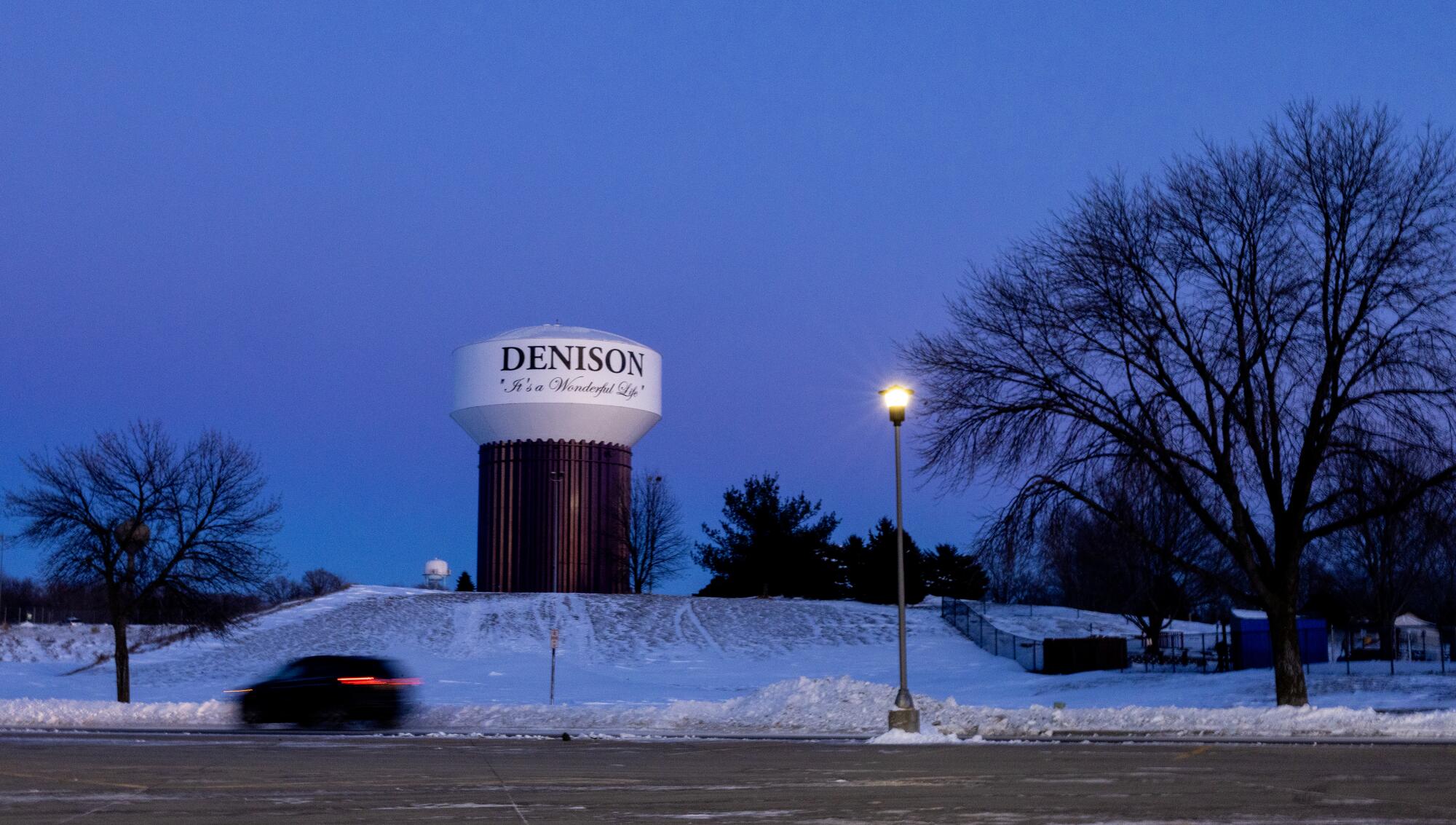
Denison is not a perfect sample of how Latinos across the country will vote in 2024 for the same reason Portland, Ore., is not a perfect sample of how white voters will vote. Local industry, culture and even ecology shape political inclinations. Expecting Venezuelan Americans in Tampa, Fla., and Salvadoran Americans in Oxnard to vote the same way is as wrongheaded as expecting white voters in Portland and a Texas oil town like Midland to cast ballots the same.
Has Biden’s standing in the state improved at all? How does Vice President Harris stand? And how much support does RFK Jr. pull (and from whom) in a general election matchup?
But some factors that predict how Latinos might vote are unique to Latinos, and they strongly influence life in Denison. Here are some questions to ask to begin to understand politics in a Latino community: How recently did families here immigrate? What industries employ them? Do they face intolerance in their daily lives?
In Denison, jobs at the meatpacking plants have brought immigrants, like Ismael, from across Latin America. The town’s Latino population is young, working-class, and made up mostly of immigrants.
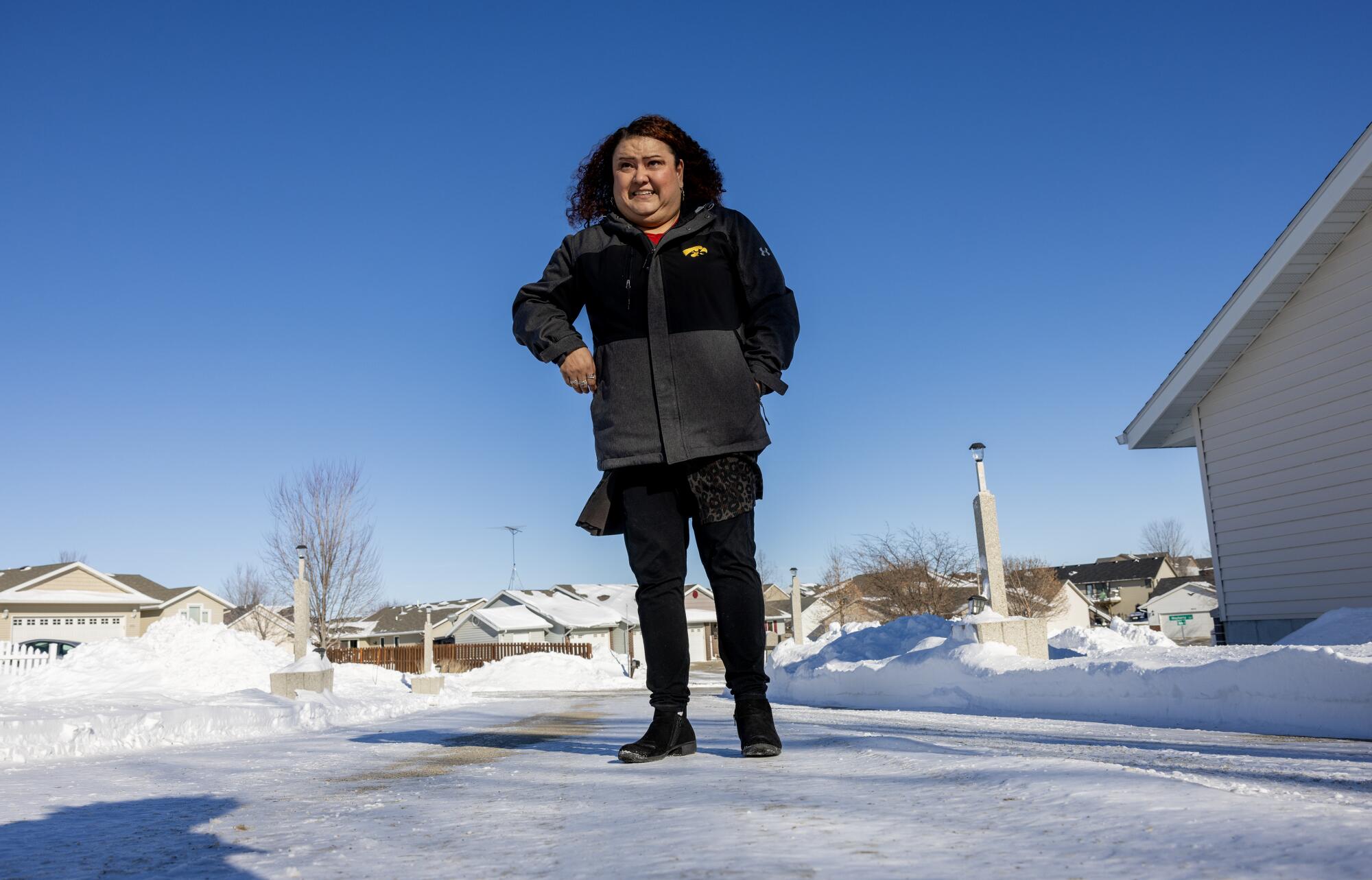
When Patricia Ritchie moved to Denison in 2004 after a childhood in Mira Loma, Calif., and two combat tours in the Army, she was one of the first Latinas in town.
“Are you here to work at the plant?” the front-desk person at Denison High asked when Ritchie stopped by to promote her services as a professional English-Spanish interpreter. Ritchie, who had moved with her husband to his family farm, felt profiled. “Back then, I didn’t even know what a plant was,” she said.
Since 1990, the Latino population of Iowa has grown more than sixfold, and Crawford County, where Denison is the county seat, is at least 30% Latino, making it the most Latino county in the state.
The county is working-class and the sort of place where Democrats have struggled in recent years. Obama narrowly won Crawford, once a swing county, in 2008, but then it sprinted to the right. In 2020, Trump won almost 68% of the vote.
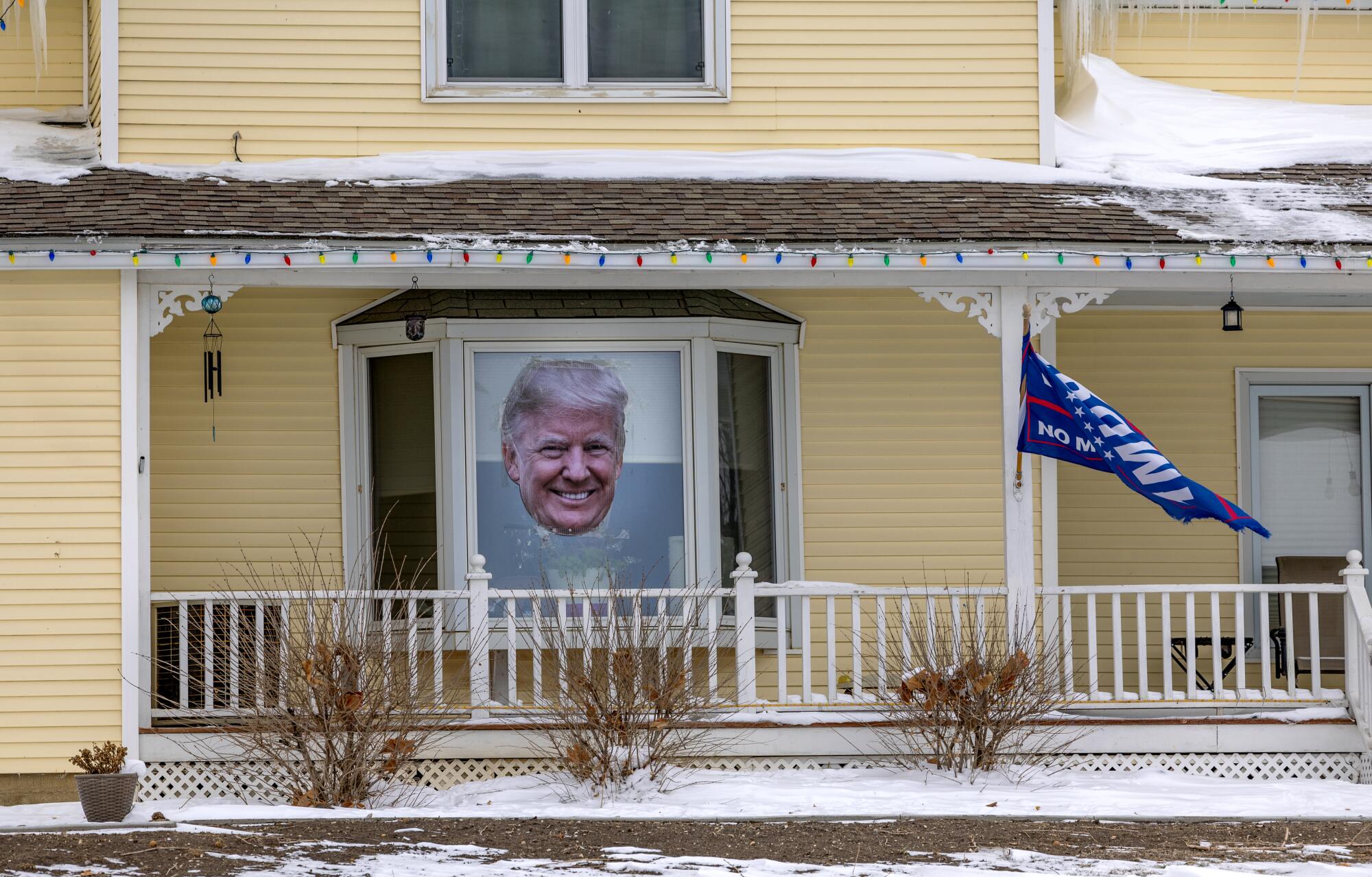
Trump’s appeals to working-class voters and his ability to channel class resentment won him enthusiastic fans in many Latino communities. Latinos are overrepresented among manual laborers and service professionals, and in majority-Latino oil towns in south Texas and farm counties in California, Trump significantly improved his numbers between 2016 and 2020.
That didn’t happen for him in Denison. Though the town went for Trump in 2020, it shifted a bit to the left. In the most Latino precincts in Denison, Biden improved on Democratic 2016 results by as much as 10 percentage points.
Ritchie — who says she’s “blue through and through” — said Democrats have had success organizing in Denison’s Latino community, whose members still face challenges with immigration status and racism — issues that don’t dominate Latino life the way they once did in some other parts of the country.
The Iowa caucus process was ‘completely foreign’ to this Southern California family. Then they got to see it up close.
Polling has found that, nationwide, immigration is not even a top-five issue for Latinos, ranking far behind the economy (No. 1), healthcare and education. Issues of race and ethnicity rank even lower.
But the situation is different in Denison. The Latino population has grown rapidly, and some white residents — who tend to be older — have reacted with unfriendliness or racism.
“We say that, when it comes to Latinos, Iowa is 20 years behind the rest of the country,” said Ritchie, who for years has worked with the local government to provide bilingual services, including as a victim advocate for the police. She and others have tried to organize the community and educate Latino Iowans about their rights. She said that this organizing often takes place under the Democratic banner.
But Democrats may be losing their lead.
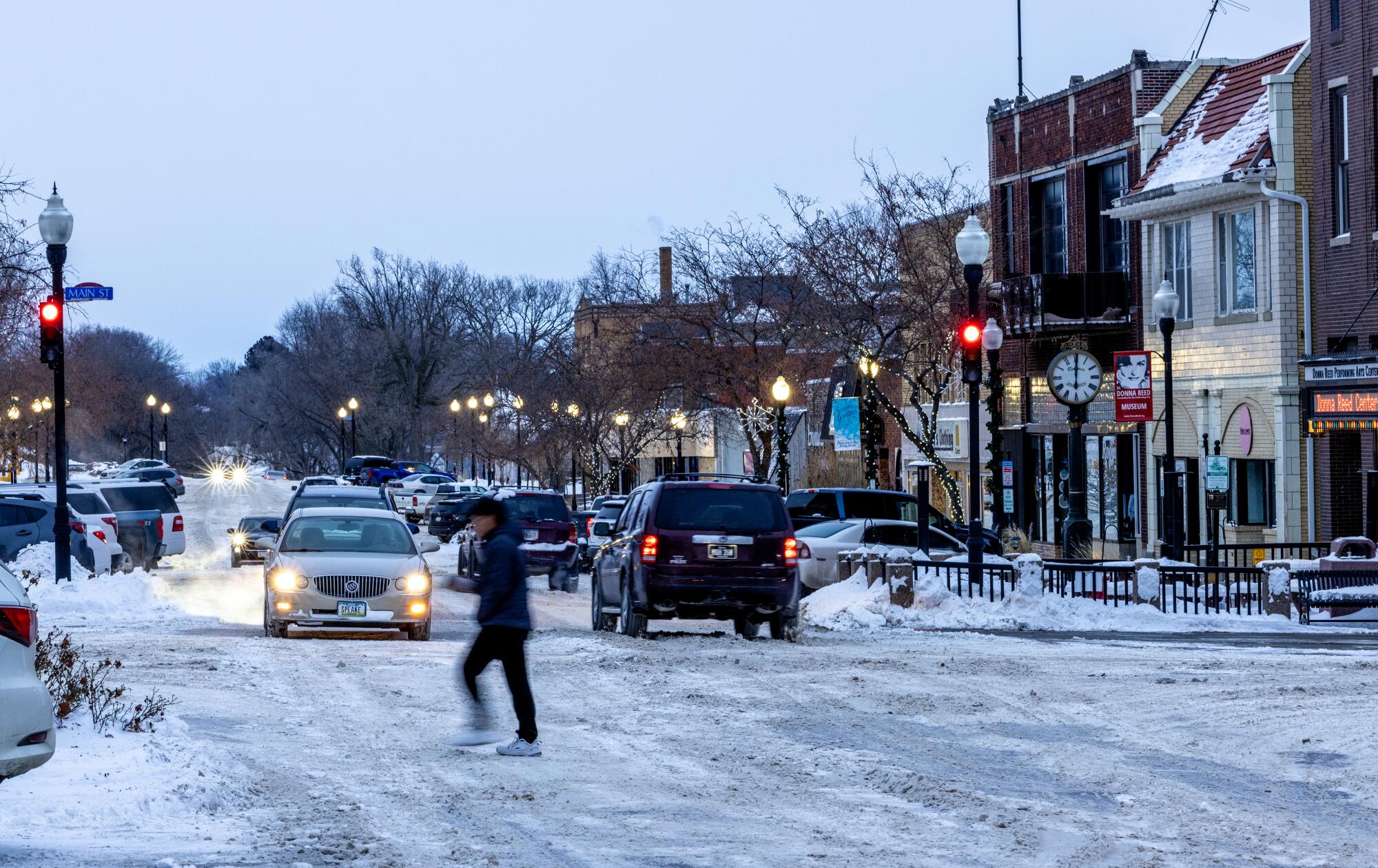
Lorena López came to Iowa in 1992 on an exchange program for Nicaraguan journalists — she and other news broadcasters were hoping to learn how to use teleprompters.
López said she was one of three Latinos in town when she arrived. Now, she’s a pillar of the community: the editor of La Prensa, a successful Spanish-language newspaper for western Iowa. She’s been a frequent advisor to local and state government, and she’s well known around town. When townspeople address her in Spanish, they call her “Doña Lorena.”
But she still doesn’t always feel welcome.
“I still get that look from people. When you walk into the room, and they’re just like, ‘guácala’” — gross — she said. “They give you a look of someone who wishes you weren’t there, that you didn’t exist.”
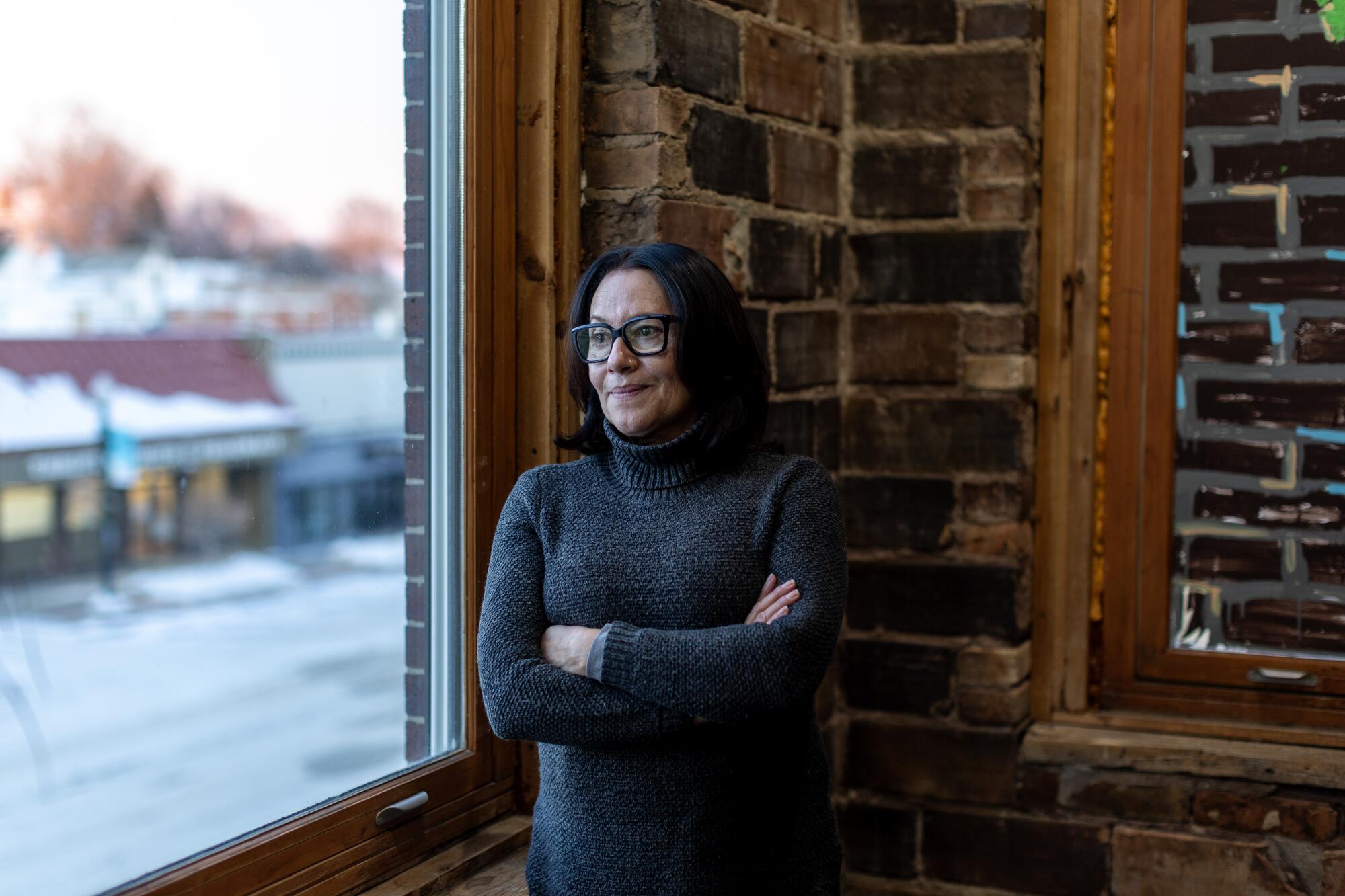
That brand of xenophobia, coupled with the constant fear of loved ones getting deported, has traditionally pushed Denison Latino voters toward the Democrats, she said. (Though, like Latino communities nationwide, voter turnout here is low.)
When asked how she thinks her community will vote in November, she shook her head slowly.
“I think they’re going to vote for Trump. I really do,” she said.
She gave three main reasons: First, voters like Vicenta are not rare. “Latinos have a long memory,” she said. They hold a grudge for Obama’s unrealized goals on immigration — which were complicated by Republican opposition in Congress — and the fact that his administration deported more people, at a faster rate, than any other.
Under Biden, she added, a new anger has flourished. Families with undocumented members are furious that many recent border-crossers have been offered official — though temporary — parole status, and some, who made it into the asylum system, have gotten work permits.
Here’s what our new poll shows about how California voters view the situation at the border and plans to change asylum rules.
“They have a lot of resentment for the broken system,” López said. “When I talk with them or I see them in church, they ask me, ‘How come they’re giving out employment authorization to people who just came here? Even though we’ve been here for so many years, we work, we have houses, we don’t have criminal records, and yet we still don’t have work permits.’”
Because Democrats have alienated some of their once-strong supporters, Republicans have a real opportunity, López said. Trump’s vision of conservatism — built around culture war issues, Christian nationalism and strongman politics — maps onto Latin American conservatism extremely well.
As an example, consider Yovan Cardenas. The son of Ismael and Vicenta, he had to grow up fast in Denison. By age 8, he was serving as an interpreter for his parents, helping with bank loans, checks for school field trips and bill payments.
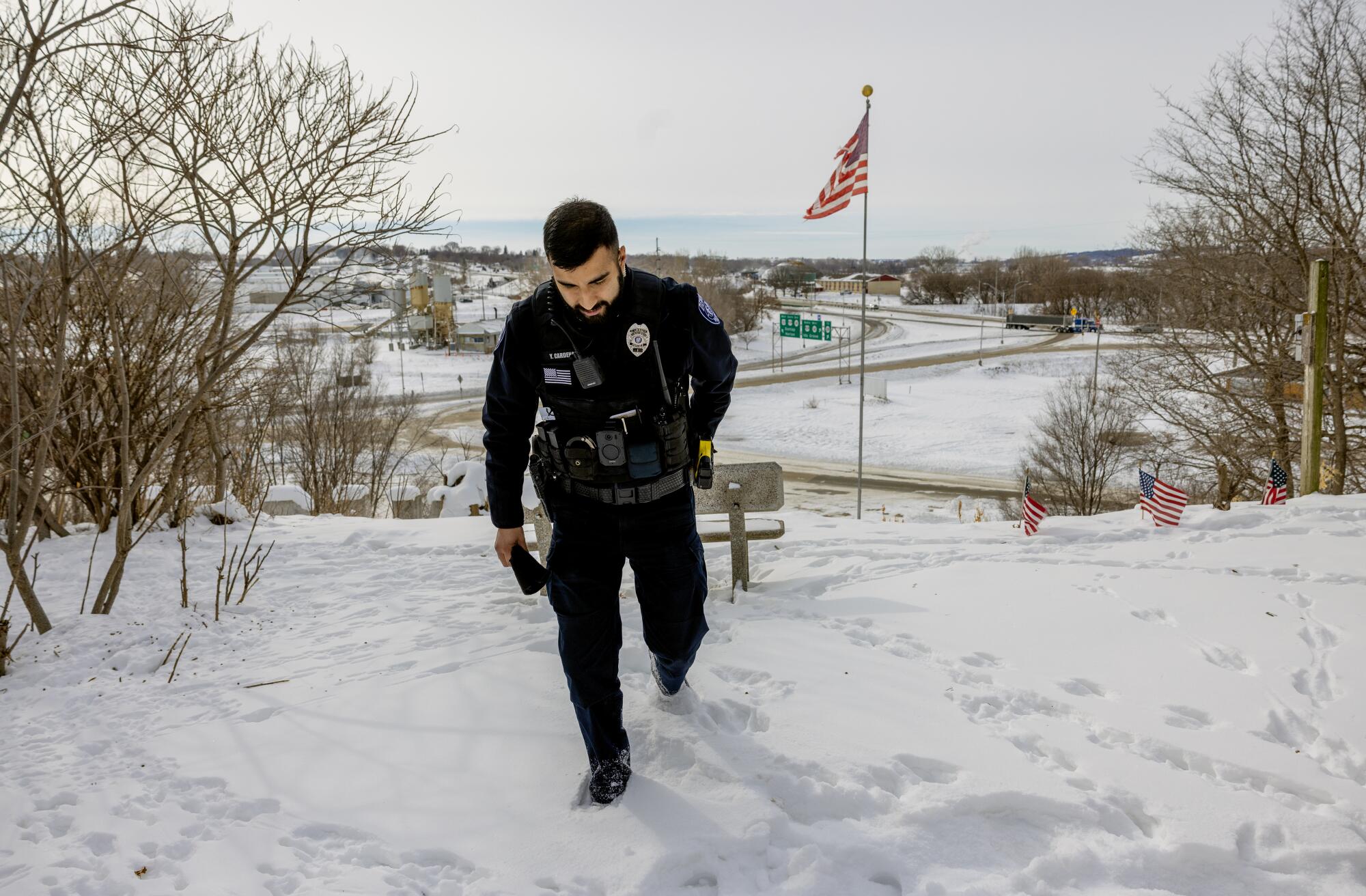
Like his mother, Yovan voted for Obama twice. But slowly, as his mother shared what she had read in the news and Yovan talked about what he’d learned studying criminal justice at the University of Iowa, the two came to agree that the values they had brought from Michoacán fit in better with the Republican Party.
Vicenta was strongly against abortion and the legalization of gay marriage. The younger Cardenas admired Republicans’ strong rhetoric in support of law enforcement. Today, he’s a police officer in Denison.
“Republicans have the same values as Hispanics: God, family and country,” he said.
Yovan said he believes that, armed with more information, other Latinos in Denison might make the same decision. But he acknowledges that Republicans in western Iowa have done little to nothing to share their message with Latino voters. There’s no door-knocking in their neighborhoods or multilingual campaign events.
GOP politicians in Iowa slammed California and its leaders in the run-up to the first presidential nominating contest in the nation Monday.
According to López, that’s not an accident. In the last 20 years, she’s covered how Republicans have campaigned against the growth of the Latino population in this part of Iowa. Denison was long represented by the far-right Republican Rep. Steve King, a full-throated opponent of multiculturalism. “We can’t restore our civilization with somebody else’s babies,” he said in 2017, drawing praise from the Ku Klux Klan.
López said: “Republicans in Crawford County are very conservative, and they’re scared of other Republicans seeing them associating with immigrants.”
Yovan Cardenas has evidence to the contrary: A leader in the county Republican Party — who he said asked not to be named — recruited him to run for sheriff this year. If he wins, he’ll become the only Latino sheriff in Iowa.
“Me winning would be a 2-for-1 special: They would get a Spanish sheriff, and they could also get more members from the Hispanic community to become Republicans,” he said.
Cardenas understands that building those bridges will be hard. When he started supporting Trump, some other Latinos accused him of selling out the culture, of trying to be white.
Cardenas says he believes that attitude might come from an emotional place, one that has less to do with policies and platforms and more to do with hometown peer pressure. He’s heard a lot of things called “white” that have nothing to do with a political position, he said. In high school, he said, other Mexican Americans would call him “pocho,” a derogotary term, for doing things as innocuous as playing baseball, which he said other Latinos called a “white sport.”
How Latinos in Iowa vote will not decide the election in November. But Latino voters in six key swing states — Michigan, Georgia, Arizona, Pennsylvania, Wisconsin and Nevada — could help determine who takes the White House.
In Michigan, Wisconsin, Pennsylvania and Georgia, many Latino communities are similar to the one in Denison: more recent, working-class immigrants who are interested in messaging on immigration and multiculturalism.
In Nevada and Arizona, some Latino families have lived there since those lands were part of Mexico, and many constitute the ethnic majority in their neighborhoods and towns. These sorts of communities will probably prioritize issues such as the economy, inflation and border control.
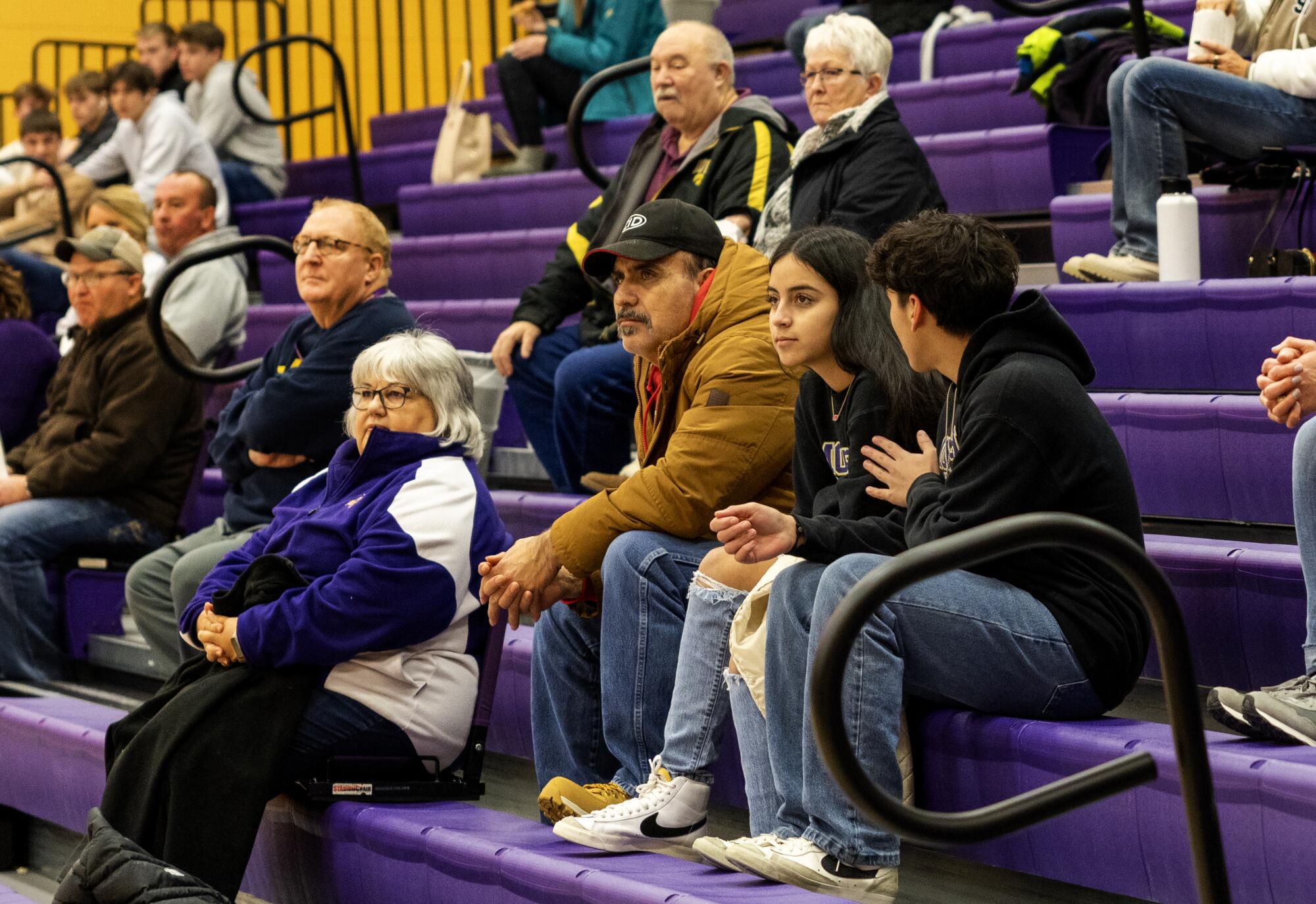
But for now, with Monday’s caucuses just a memory, residents of Denison, Latino and non-Latino, got back to life in a small town.
On Tuesday night, back at Denison High for a basketball game, Vicenta looked on proudly as her daughter Gaby played on the varsity team. “She’s easy to spot,” Vicenta explained. “She’s the only Latina on the team.”
Vicenta, a custodian at the school, said she’s raising her kids to be ambitious, to be useful in their communities. Gaby is studying to go to college become a doctor.
And Vicenta and her husband hope they’re setting an example by showing up to use their voices at local political events. By the end of the evening at the Denison caucus, Ismael had cast his vote for Trump, and Vicenta for Vivek Ramaswamy.
More to Read
Sign up for Essential California
The most important California stories and recommendations in your inbox every morning.
You may occasionally receive promotional content from the Los Angeles Times.
